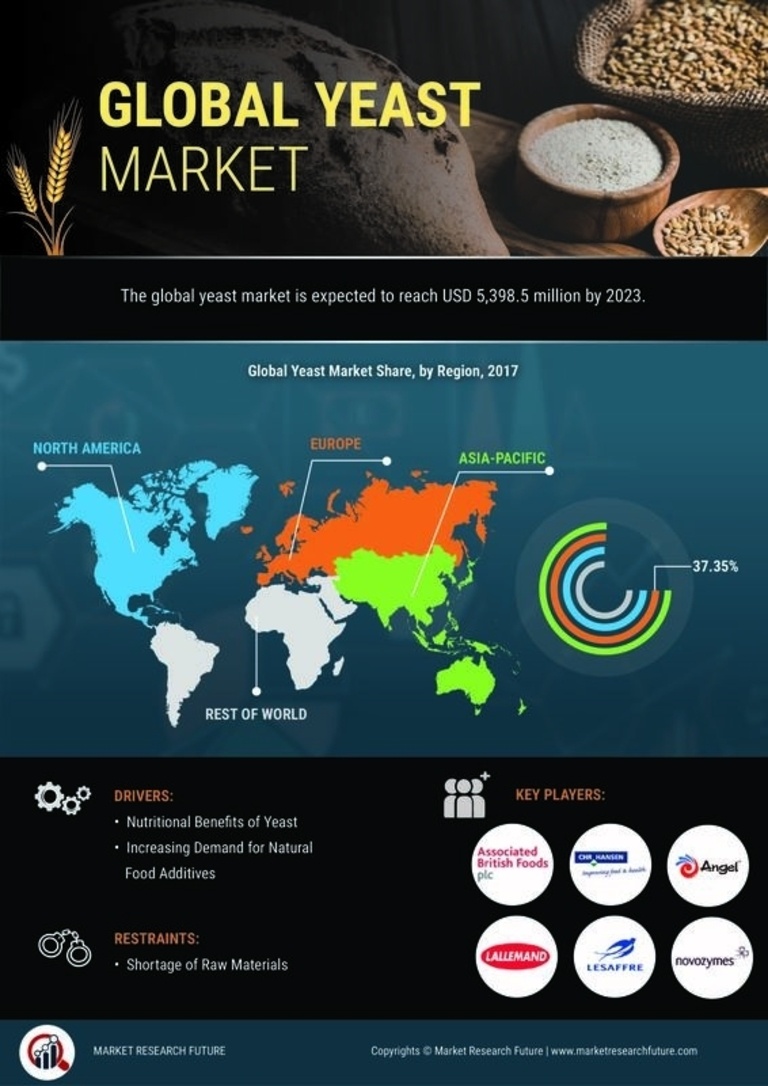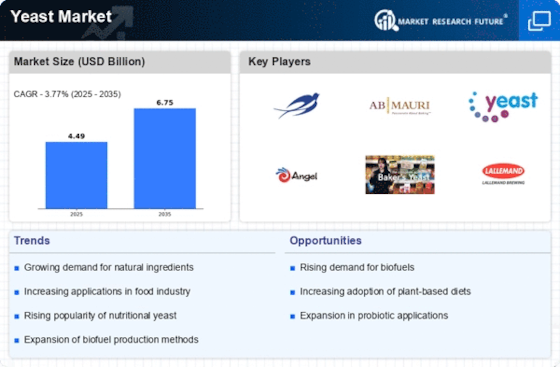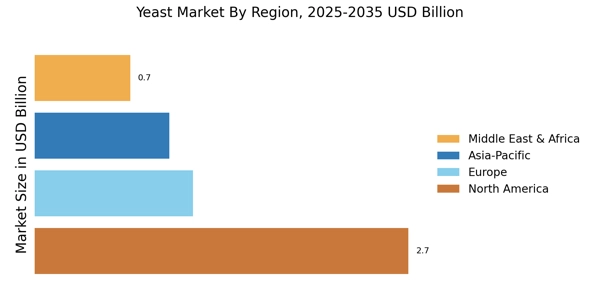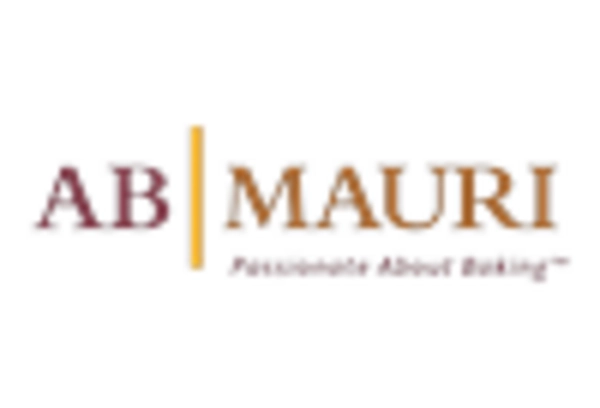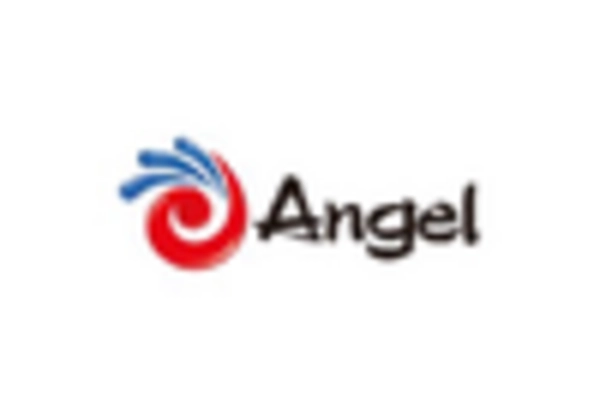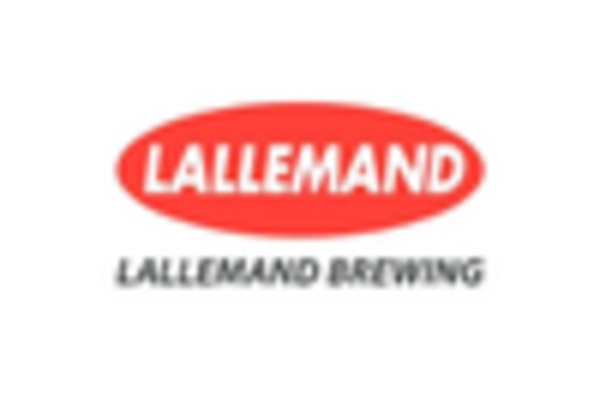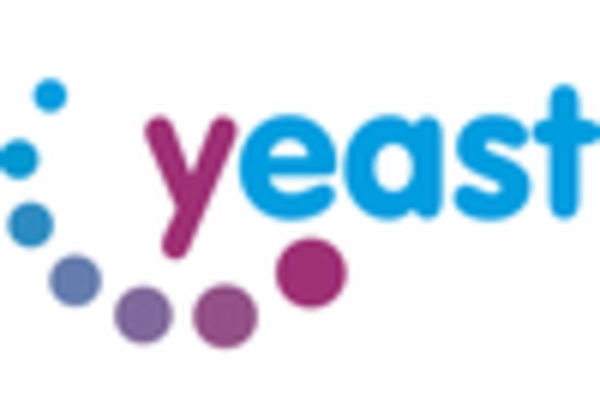Expansion of the Bakery Sector
The Yeast Market is significantly influenced by the expansion of the bakery sector, which remains one of the largest consumers of yeast. The Yeast Market is projected to reach a valuation of over 500 billion dollars by 2026, with a substantial portion attributed to the rising consumption of bread, pastries, and other baked goods. This growth is largely driven by changing lifestyles and the increasing demand for convenience foods. As a result, the need for yeast, which plays a crucial role in leavening and flavor development, is expected to increase. Additionally, the trend towards clean label products is prompting bakers to seek natural yeast options, further enhancing the Yeast Market. The integration of innovative baking techniques and the introduction of gluten-free products also contribute to the evolving landscape of the yeast market.
Rising Popularity of Nutritional Yeast
The Yeast Market is witnessing a growing interest in nutritional yeast, particularly among health-conscious consumers and those following plant-based diets. Nutritional yeast is rich in vitamins, minerals, and protein, making it a favored ingredient in vegan and vegetarian cooking. Market analysis suggests that the nutritional yeast segment is expected to grow at a robust rate, driven by the increasing awareness of its health benefits. This trend is further supported by the rise of online retail platforms, which facilitate access to specialty health products. As consumers seek alternatives to traditional dairy and meat products, the demand for nutritional yeast is likely to expand, thereby positively impacting the Yeast Market. The versatility of nutritional yeast in enhancing flavors in various dishes also contributes to its appeal among culinary enthusiasts.
Increasing Demand for Fermented Products
The Yeast Market is experiencing a notable surge in demand for fermented products, driven by consumer preferences for health-oriented foods. Fermented items such as yogurt, kefir, and kombucha are gaining traction, as they are perceived to offer probiotic benefits. This trend is reflected in market data, indicating that the fermented food sector is projected to grow at a compound annual growth rate of approximately 8% over the next five years. As consumers become more health-conscious, the demand for yeast as a fermentation agent is likely to rise, thereby bolstering the Yeast Market. Furthermore, the increasing popularity of artisanal and craft beverages, including beer and wine, further fuels the need for high-quality yeast strains, which are essential for achieving desired flavor profiles and fermentation efficiency.
Growing Interest in Sustainable Practices
The Yeast Market is increasingly influenced by the growing interest in sustainable practices among consumers and manufacturers. There is a rising awareness of the environmental impact of food production, prompting stakeholders to seek eco-friendly alternatives. Yeast Market, being a natural and renewable resource, aligns well with sustainability goals. The market is witnessing a shift towards organic and non-GMO yeast products, as consumers prioritize transparency and ethical sourcing. Additionally, the use of yeast in biofuel production is gaining traction, as it offers a sustainable solution for energy generation. This trend is likely to drive innovation in the Yeast Market, as companies explore ways to enhance the sustainability of their production processes. The emphasis on reducing waste and utilizing by-products from yeast fermentation further underscores the potential for growth in this sector.
Technological Advancements in Yeast Production
The Yeast Market is benefiting from technological advancements in yeast production processes. Innovations such as genetic engineering and fermentation technology are enhancing the efficiency and quality of yeast strains. These advancements enable producers to develop yeast with specific characteristics, such as improved fermentation rates and resistance to environmental stressors. Market data indicates that the adoption of advanced fermentation technologies is expected to increase, leading to higher yields and reduced production costs. As the demand for specialized yeast strains rises, manufacturers are likely to invest in research and development to create tailored solutions for various applications, including baking, brewing, and bioethanol production. This focus on innovation is anticipated to drive growth within the Yeast Market, as companies strive to meet the evolving needs of consumers and industries alike.
